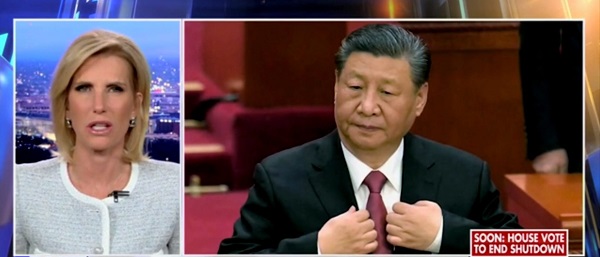Censorship Industrial Complex
Biden FBI to resume colluding with Big Tech after Supreme Court rejects free speech case

From LifeSiteNews
The most dangerous aspect to the issue is the extent to which the government actively encourages private companies to censor disfavored speech, something in which emails, public statements, congressional investigation, leaked documents, and even open admissions have implicated the Biden administration.
The Biden administration’s FBI intends to resume meetings with social media companies on content decisions, a month after the U.S. Supreme Court rejected a bid to stop such coordination as infringing on free speech.
National Review reports that U.S. Department of Justice Inspector General Michael Horowitz’s July 2024 report on the DOJ’s “Efforts to Coordinate Information Sharing About Foreign Malign Influence Threats to U.S. Elections” contains a memo stating that the FBI “will resume regular meetings in the coming weeks with social media companies to brief and discuss potential FMI [Foreign Malign Influence] threats involving the companies’ platforms.”
Horowitz’s report “make[s] two recommendations to ensure that DOJ takes a public and strategic approach to sharing information with social media companies in a manner that protects First Amendment rights to combat foreign malign influence directed at U.S. elections,” ostensibly to build trust with the general public.
The first is to “[d]evelop an approach for informing the public about the procedures the Department has put into place to transmit foreign malign influence threat information to social media companies that is protective of First Amendment rights.” The second is to “[d]evelop and implement a comprehensive strategy to ensure that the Department of Justice’s approach to information sharing with social media companies to combat foreign malign influence directed at U.S. elections can adapt to address the evolving threat landscape.”
For years, conservatives and other dissenters from left-wing orthodoxy have criticized the world’s largest online information and communications platforms, including Google, Facebook, and (until ownership changed hands in late 2022) Twitter, for using their vast influence to slant the news, sources, ideas, and arguments their users see and share through their services. One of their chief rationales for doing so was to prevent “misinformation” from influencing elections, which critics denounce as merely a pretext to sway elections in their favor.
The most dangerous aspect to the issue is the extent to which the government actively encourages private companies to censor disfavored speech, something in which emails, public statements, congressional investigation, leaked documents, and even open admissions have implicated the Biden administration.
Starting under the Trump administration and continuing into the Biden White House, the U.S. Cybersecurity & Infrastructure Security Agency (CISA) and the U.S. State Department’s Global Engagement Center (GEC) have factored heavily into these activities, working with Stanford University and other entities to establish the Election Integrity Partnership (EIP), through which requests to censor “thousands” of conservative posts could be laundered so as to keep the government’s fingerprints off censorship decisions.
The news of the FBI resuming meetings with Big Tech follows the Supreme Court’s 6-3 ruling in June’s Murthy v. Missouri, which concerned whether the federal government “asking” platforms such as Facebook, Instagram, and YouTube to delete objectionable content constitutes government censorship in violation of the First Amendment. Rather than answer that question, the Court’s majority decision written by Justice Amy Coney Barrett ruled that the plaintiffs – the states of Louisiana and Missouri as well as social media users themselves – lacked standing to bring the case.
The court’s three most conservative justices, Samuel Alito, Clarence Thomas, and Neil Gorsuch dissented, writing that “[w]hen the White House pressured Facebook to amend some of the policies related to speech in which [one plaintiff] engaged, those amendments necessarily impacted some of Facebook’s censorship decisions. Nothing more is needed.”
Polls currently indicate a close race between former President Donald Trump and Vice President Kamala Harris, in which many speculate that manipulating what information is allowed to spread on social media could shift a potentially decisive number of votes in states where the gap between the candidates is small enough.
Censorship Industrial Complex
EU’s “Democracy Shield” Centralizes Control Over Online Speech

Presented as a defense of democracy, the plan reads more like the architecture of a managed reality.
|
European authorities have finally unveiled the “European Democracy Shield,” we’ve been warning about for some time, a major initiative that consolidates and broadens existing programs of the European Commission to monitor and restrict digital information flows.
Though branded as a safeguard against “foreign information manipulation and interference (FIMI)” and “disinformation,” the initiative effectively gives EU institutions unprecedented authority over the online public sphere.
At its core, the framework fuses a variety of mechanisms into a single structure, from AI-driven content detection and regulation of social media influencers to a state-endorsed web of “fact-checkers.”
The presentation speaks of defending democracy, yet the design reveals a machinery oriented toward centralized control of speech, identity, and data.
One of the more alarming integrations links the EU’s Digital Identity program with content filtering and labelling systems.
The Commission has announced plans to “explore possible further measures with the Code’s signatories,” including “detection and labelling of AI-generated and manipulated content circulating on social media services” and “voluntary user-verification tools.”
Officials describe the EU Digital Identity (EUDI) Wallet as a means for “secure identification and authentication.”
In real terms, tying verified identity to online activity risks normalizing surveillance and making anonymity in expression a thing of the past.
The Democracy Shield also includes the creation of a “European Centre for Democratic Resilience,” led by Justice Commissioner Michael McGrath.
Framed as a voluntary coordination hub, its mission is “building capacities to withstand foreign information manipulation and interference (FIMI) and disinformation,” involving EU institutions, Member States, and “neighboring countries and like-minded partners.”
The Centre’s “Stakeholder Platform” is to unite “trusted stakeholders such as civil society organizations, researchers and academia, fact-checkers and media providers.”
In practice, this structure ties policymaking, activism, and media oversight into one cooperative network, eroding the boundaries between government power and public discourse.
Financial incentives reinforce the system. A “European Network of Fact-Checkers” will be funded through EU channels, positioned as independent yet operating within the same institutional framework that sets the rules.
The network will coordinate “fact-checking” in every EU language, maintain a central database of verdicts, and introduce “a protection scheme for fact-checkers in the EU against threats and harassment.”
Such an arrangement destroys the line between independent verification and state-aligned narrative enforcement.
The Commission will also fund a “common research support framework,” giving select researchers privileged access to non-public platform data via the
Digital Services Act (DSA) and Political Advertising Regulation.
Officially, this aims to aid academic research, but it could also allow state-linked analysts to map, classify, and suppress online viewpoints deemed undesirable.
Plans extend further into media law. The European Commission intends to revisit the Audiovisual Media Services Directive (AVMSD) to ensure “viewers – particularly younger ones – are adequately protected when they consume audiovisual content online.”
While framed around youth protection, such language opens the door to broad filtering and regulation of online media.
Another initiative seeks to enlist digital personalities through a “voluntary network of influencers to raise awareness about relevant EU rules, including the DSA.” Brussels will “consider the role of influencers” during its upcoming AVMSD review.
Though presented as transparent outreach, the move effectively turns social media figures into de facto promoters of official EU messaging, reshaping public conversation under the guise of awareness.
The Shield also introduces a “Digital Services Act incidents and crisis protocol” between the EU and signatories of the Code of Practice on Disinformation to “facilitate coordination among relevant authorities and ensure swift reactions to large-scale and potentially transnational information operations.”
This could enable coordinated suppression of narratives across borders. Large platforms exceeding 45 million EU users face compliance audits, with penalties reaching 6% of global revenue or even platform bans, making voluntary cooperation more symbolic than real.
A further layer comes with the forthcoming “Blueprint for countering FIMI and disinformation,” offering governments standardized guidance to “anticipate, detect and respond” to perceived information threats. Such protocols risk transforming free expression into a regulated domain managed under preemptive suspicion.
Existing structures are being fortified, too. The European Digital Media Observatory (EDMO), already central to “disinformation” monitoring, will receive expanded authority for election and crisis surveillance. This effectively deepens the fusion of state oversight and online communication control.
Funding through the “Media Resilience Programme” will channel EU resources to preferred outlets, while regulators examine ways to “strengthen the prominence of media services of general interest.”
This includes “impact investments in the news media sector” and efforts to build transnational platforms promoting mainstream narratives. Though described as supporting “independent and local journalism,” the model risks reinforcing state-aligned voices while sidelining dissenting ones.
Education and culture are not exempt. The Commission plans “Guidelines for teachers and educators on tackling disinformation and promoting digital literacy through education and training,” along with new “media literacy” programs and an “independent network for media literacy.”
While such initiatives appear benign, they often operate on the assumption that government-approved information is inherently trustworthy, conditioning future generations to equate official consensus with truth.
Viewed as a whole, the European Democracy Shield represents a major institutional step toward centralized narrative management in the European Union.
Under the language of “protection,” Brussels is constructing a comprehensive apparatus for monitoring and shaping the flow of information.
For a continent that once defined itself through open debate and free thought, this growing web of bureaucratic control signals a troubling shift.
Efforts framed as defense against disinformation now risk becoming tools for suppressing dissent, a paradox that may leave European democracy less free in the name of making it “safe.”
|
|
|
|
You read Reclaim The Net because you believe in something deeper than headlines; you believe in the enduring values of free speech, individual liberty, and the right to privacy.
Every issue we publish is part of a larger fight: preserving the principles that built this country and protecting them from erosion in the digital age.
With your help, we can do more than simply hold the line: we can push back. We can shine a light on censorship, expose growing surveillance overreach, and give a voice to those being silenced.
If you’ve found any value in our work, please consider becoming a supporter.
Your support helps us expand our reach, educate more people, and continue this work.
Please become a supporter today.
Thank you for your support.
|
Censorship Industrial Complex
School Cannot Force Students To Use Preferred Pronouns, US Federal Court Rules


From the Daily Caller News Foundation
“Our system forbids public schools from becoming ‘enclaves of totalitarianism.’”
A federal appeals court in Ohio ruled Thursday that students cannot be forced to use preferred pronouns in school.
Defending Education (DE) filed the suit against Olentangy Local School District (OLSD) in 2023, arguing the district’s anti-harassment policy that requires students to use the “preferred pronouns” of others violates students’ First Amendment rights by “compelling students to affirm beliefs about sex and gender that are contrary to their own deeply held beliefs.” Although a lower court attempted to shoot down the challenge, the appeals court ruled in a 10-7 decision that the school cannot “wield their authority to compel speech or demand silence from citizens who disagree with the regulators’ politically controversial preferred new form of grammar.”
Because the school considers transgender students to be a protected class, students who violated the anti-harassment policy by referring to such students by their biological sex risked punishments such as suspension and expulsion, according to DE.
Dear Readers:
As a nonprofit, we are dependent on the generosity of our readers.
Please consider making a small donation of any amount here.
Thank you!
“American history and tradition uphold the majority’s decision to strike down the school’s pronoun policy,” the court wrote in its opinion. “Over hundreds of years, grammar has developed in America without governmental interference. Consistent with our historical tradition and our cherished First Amendment, the pronoun debate must be won through individual persuasion, not government coercion. Our system forbids public schools from becoming ‘enclaves of totalitarianism.’”
OLSD did not respond to the Daily Caller News Foundation’s request for comment.
“We are deeply gratified by the Sixth Circuit’s intensive analysis not only of our case but the state of student First Amendment rights in the modern era,” Nicole Neily, founder and president of DE, said in a statement. “The court’s decision – and its many concurrences – articulate the importance of free speech, the limits and perils of public schools claiming to act in loco parentis, and the critical role of persuasion – rather than coercion – in America’s public square.”
“Despite its ham-fisted attempt to moot the case, Olentangy School District was sternly reminded by the 6th circuit en banc court that it cannot force students to express a viewpoint on gender identity with which they disagree, nor extend its reach beyond the schoolhouse threshold into matters better suited to an exercise of parental authority,” Sarah Parshall Perry, vice president and legal fellow at DE, said in a statement. “A resounding victory for student speech and parental rights was long overdue for families in the school district and we are thrilled the court’s ruling will benefit others seeking to vindicate their rights in the classroom and beyond.”
-

 Frontier Centre for Public Policy1 day ago
Frontier Centre for Public Policy1 day agoRichmond Mayor Warns Property Owners That The Cowichan Case Puts Their Titles At Risk
-

 Alberta2 days ago
Alberta2 days agoHow economic corridors could shape a stronger Canadian future
-

 Daily Caller2 days ago
Daily Caller2 days agoProtesters Storm Elite Climate Summit In Chaotic Scene
-

 Alberta2 days ago
Alberta2 days agoWhen Teachers Say Your Child Has Nowhere Else to Go
-

 Daily Caller1 day ago
Daily Caller1 day agoLaura Ingraham’s Viral Clash With Trump Prompts Her To Tell Real Reasons China Sends Students To US
-

 Business23 hours ago
Business23 hours agoP.E.I. Moves to Open IRAC Files, Forcing Land Regulator to Publish Reports After The Bureau’s Investigation
-

 Energy22 hours ago
Energy22 hours agoCanada’s oilpatch shows strength amid global oil shakeup
-

 Business1 day ago
Business1 day agoSluggish homebuilding will have far-reaching effects on Canada’s economy





